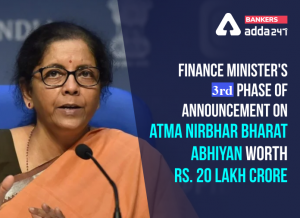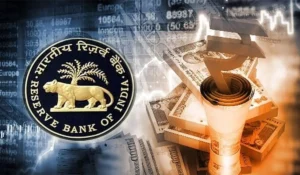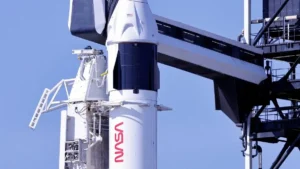
Union Finance Minister Nirmala Sitharaman has announced the details of the 3rd tranche of Economic Relief Package for “Aatmanirbhar Bharat Abhiyan” amid COVID-19 pandemic. This 3rd tranche is the part of economic package of Rs 20 lakh crore has been announced with the prime objective of making India self-reliant.
The third tranche of Economic Relief Package for “Aatmanirbhar Bharat Abhiyan” is dedicated to agriculture and allied activities such as fisheries, dairy and animal husbandry.
During her address, she mentioned that the 3rd tranche comprises of 11 different measures according to the given composition: eight of them related to strengthening infrastructure, strengthening capacities, building better logistics etc, and rest three will be related to governance and administrative reforms.
Highlights of measures announced in 3rd tranche, as part of Economic Relief Package for “Aatmanirbhar Bharat Abhiyan”:
1. Rs 1 lakh crore Agri Infrastructure Fund for farm gate infrastructure for farmers
- Due to lack of adequate cold chain and Post Harvest Management infrastructure in the vicinity of farm-gate, the Government of India is launching financing facility of Rs 1 lakh crore to fund Agriculture Infrastructure Projects at farm-gate and aggregation points such as Primary Agriculture Cooperative Societies, Farmer Producer Organisation, Agriculture Entrepreneurs, Start-ups, etc.
- It will help in providing stimulus to the development of farm-gate & aggregation points, affordable and financially viable Post Harvest Management infrastructure.
- This fund of Rs 1 lakh crore would be created immediately.
2. For Micro Food Enterprises
As the un-organised Micro Food Enterprises (MFEs) units requires technical upgradation to attain FSSAI food standards, building brands and marketing purposes.
- To achieve this, Government of India will launch a Rs 10,000 Crore scheme for formalisation of Micro Food Enterprises which is expected to benefit 2 lakh MFEs.
- This scheme will be based on a cluster based approach and will support the existing micro food enterprises, Farmer producer organisations, Self Help Groups as well as the cooperatives.
- The scheme will help in reaching untapped export markets in view of improved health consciousness, and will also lead to improved health and safety standards, integration with retail markets as well as improved incomes.
3. Logistics capacities and other provision of facilities under the Pradhan Mantri Matsya Sampada Yojana (PMMY)
- Government of India has announced the support of Rs 20,000 crore for Fishermen through Pradhan Mantri Matsya Sampada Yojana which would be launched for integrated, sustainable, inclusive development of marine and inland fisheries.
- From Rs 20,000 crore, amount of Rs 11,000 crore would be used for activities in Marine, Inland Fisheries and aquaculture.
- The remaining amount of Rs 9,000 crore would be used for Infrastructure such as fishing harbours, cold chain, markets, etc.
- Cage culture, seaweed farming, Ornamental Fisheries as swell as new fishing vessels, traceability, laboratory network, etc will be the key activities.
- During the ban period i.e. the period when the fishermen are not allowed to enter the sea and the fishing is prohibited, there would be a provision of Ban Period Support to fishermen in the form of Personal insurance as well as Boat insurance.
- This is expected to give employment to over 55 lakh persons and will double the exports to Rs 1,00,000 Crore, and lead to additional fish production of 70 lakh tonnes over a period of 5 years.
4. National Animal Disease Control Programme
- National Animal Disease Control Programme for Foot and Mouth Disease (FMD) and Brucellosis launched with total outlay of Rs. 13,343 crores.
- It ensures 100% vaccination of cattle, buffalo, sheep, goat and pig population (total 53 crore animals) for Foot and Mouth Disease (FMD) and for brucellosis.
- Till date, 1.5 crore cows & buffaloes in the country have been tagged and vaccinated.
5. For building capacities in Animal Husbandry
Government of India has planned to spend Rs 15,000 crores for the development of Animal Husbandry Infrastructure with special focus on dairy sector.
- GoI has decided to set up an Animal Husbandry Infrastructure Development Fund of Rs 15,000 crore. It also aims to support private investment in the Dairy processing, value addition and cattle feed infrastructure.
- Government will also offer incentives for establishing plants for export of niche products such as cheese, processed milk, milk powder, cream etc.
6. For promotion of Herbal Cultivation
- Government of India has decided to allocate Rs 4000 crore to cover 10,00,000 hectares area under the Herbal Cultivation in next two years.
- National Medicinal Plant Board (NMPB) has already supported 2.25 lac hectare area under the cultivation of medicinal plants.
- This will lead to generate about Rs 5000 crores of income generation for farmers.
- NMPB will bring 800 hectare area by developing a corridor of medicinal plants along the banks of river Ganga.
- A network of regional mandis would be set up for the Medicinal plants.
7. Beekeeping Initiatives
- Government of India has announced Rs 500 crores scheme to increase the income of 2 lakh beekeepers and will help in providing quality honey to the consumers.
- It has been launched to increase yield & quality of crops through pollination, and will also provide honey and other beehive products like wax.
- Government will implement a scheme for the development of infrastructure related to Integrated Beekeeping Development Centres, Collection, Marketing and Storage Centres, Post Harvest & Value Adition Facilities etc.
- It will lead to implementation of standards, development of traceability systems; and development of quality nucleus stock as well as bee breeders.
- It will also lead to capacity building with special focus on women.
8. From TOP to TOTAL
- Government of India has decided to extend the Operation Greens from Tomatoes, Onion & Potatoes (TOP) to All Fruit and Vegetables (TOTAL). Amount of Rs 500 crore has been allocated to this scheme.
- This scheme will be on pilot basis for next 6 months and will be expanded and extended accordingly.
- The scheme will provide 50% subsidy on transportation from surplus to deficient markets. It will also provide 50% subsidy on storage including cold storages.
- It is expected to result in better price realization to farmers, reduced wastages as well as affordability of products for consumers.
Governance & Administrative Reforms
9. Amendment in Essential Commodities Act
- Essential Commodities Act was enacted in 1955. Government of India has decided to amend the Essential Commodities Act to enable better price realisation for farmers. This will be done by attracting investments and making agriculture sector competitive.
- Agriculture food stuffs including cereals, edible oils, oil seeds, pulses, onions and potato to be deregulated.
- Stock limit will be imposed under very exceptional circumstances such as national calamities, famine with surge in prices, while no such stock limit shall apply to processors or value chain participant, subject to their installed capacity or to any exporter subject to the export demand.
10. Agriculture Marketing Reforms
- Government of India has decided to formulate a central law to provide adequate choices to farmer to sell produce at attractive price, a barrier free Inter-State Trade, and a framework for e-trading of agriculture produce.
11. Agriculture Produce Price and Quality Assurance
- Government of India has decided to create a facilitative legal framework to enable farmers for engaging with processors, aggregators, large retailers, exporters etc. in a fair and transparent manner.
- The integral part of the legal framework will include risk mitigation for farmers, assured returns and quality standardisation.



 India vs Pakistan – T20 World Cup MCQs
India vs Pakistan – T20 World Cup MCQs
 RBI Proposes Tighter Lending Norms for R...
RBI Proposes Tighter Lending Norms for R...
 Vast Space Signs Deal with NASA for Priv...
Vast Space Signs Deal with NASA for Priv...








